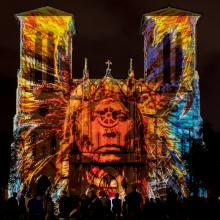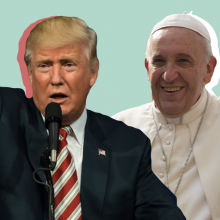Opinion
The pope talks about environmental protections from a spiritual perspective — an understanding of creation as a holy and precious gift from God, to be revered by all. We should make it a priority to keep our air clean, our water pristine, and our land whole. Whether we understand environmental stewardship as a God-given moral responsibility or from an economic and military strategic viewpoint, the fact remains: Environmental instability is inextricably linked to economic instability and increased discord throughout the world.
The biggest issue War Machine faces is that satire seems to be the wrong track for the movie to take. War and soldiers are difficult subjects to make funny. The best that writer-director Michôd can manage is to provide the stars — like Pitt and his military cohort — with a couple of strange quirks to color their performances. Sometimes these characterizations feel lazy, other times like the actors are trying too hard. The humor, when it’s there, feels forced.

San Fernando Cathedral with Native American Light Show in San Antonio, Texas. Kelly vanDellen / Shutterstock.com
A young indigenous man from the Quinault Indian Nation was killed on Saturday night by a man witnesses describe as a white, in his 30s, who shouted racial slurs before backing over two men with his pickup truck, reports the Seattle Times. But you probably haven’t heard this news, not with all the other news floating through cyberspace.
Most often Pentecost comes to us as a momentous Christian occasion of spiritual power, ethnic unity, gender equality, multi-generational comradery, and immigrant hospitality. But when the moment has passed, it gives way to the more ignoble features of life and community, like spiritual apathy, sexism, racial prejudice, ageism, xenophobia, etc.
On Capitol Hill, we find Democrats acknowledge climate change, affirm the need for action, and sometimes even express frustration and discouragement that there has not been more action. It is as if they need more hope. On the other hand, we find Republicans continue to minimize climate change as a problem or maximize the unworkable unaffordability of a solution. Yet sometimes, off camera and behind the scenes, we encounter Republicans who fear calling for climate action due to the risk of being “primary-ed” or knocked out of an election in a primary. It is as if they need more courage.
The heightening militarism following Trump’s invitation to Duterte is neither unrelated nor isolated from U.S imperialism in the Philippines — a history that is often manipulated through religious language.
Why did it take clichéd pop verses in English — lyrics that could be copy-and-pasted to any Bieber song and wouldn’t feel out of place — and some mediocre Spanish singing for “Despacito" to get its due?
The June 28-July 1 event he calls “a bit of a vacation in a spiritual atmosphere” drew 90,000 when it was last held in 2015 — a predominantly black crowd that also included whites, Hispanics, and people from 40 other countries.
Jakes, an author, media producer, and pastor of The Potter’s House talked to Religion News Service about bridging racial and political divides, coping with terrorist threats, and his approaching 60th birthday.
No longer will I be the single woman in my 30s, always a bridesmaid but never a bride. It doesn’t mean that I will not struggle to trust God with my life. But it will be a reminder to me — and to all our witnesses — that God does answer prayer, and all the suffering and sorrow that came before can been remade into something more glorious than it was before.
Social media, and Twitter especially, has become a place where people of all beliefs can come together for conversations about all manner of things, from men’s rompers to views on abortion. And from our worship leaders and in our pulpits, we hear the word of God for the people of God again, this time in person. So we’re constantly processing, constantly asking what God is saying to us, constantly asking who we should be as an institution, as the body of Christ.
But the strong affirmation of Christ’s absence kept the early church from centralizing around Jerusalem. Without the body of Jesus to create a memorial, no land or language could monopolize claim to sacredness. Ascension, in one sense, is an abdication of worldly authority. It is the empowerment of everyone, no matter their land and language.
Since hearing the news, I have anguished over one question: Why did white evangelical silence over this unprovoked attack by this white man on the black man bother me so much? Certainly racial attacks against African Americans by white Americans is not a new phenomenon. My answer came in reading the response of the judge where the attacker was held without bond.

Donald Trump, image via Evan El-Amin / Shutterstock.com; Pope Francis image via Nick McCready / Shutterstock.com
Today is the historic meeting between President Donald Trump and Pope Francis, part of the three-nation visit the White House staff has been planning for weeks, following the well-established and delicate protocols that ensure a smooth visit with foreign leaders, before it all goes to crap with an early-morning tweet. (Several White House staffers have reportedly developed numbness in their hands from keeping their fingers crossed for the first hundred days of the Trump administration. And in packing for this trip, those same staffers had to find space for the president’s extra shoes, since another one seems to drop almost every day.)
Several years ago, Sojourners asked that question, leading a campaign to remind our leaders in Washington that: “A budget is a moral document. Our faith tells us that the moral test of a society is how it treats the poor. As a country, we face difficult choices, but whether or not we defend vulnerable people should not be one of them.” As we look at the priorities outlined in the Trump administration’s 2018 budget released today, it’s worth asking again: What would Jesus cut?
It is not only religion, and not only one particular religion, that produces murderous subcultures. Sometimes these subcultures are nationalist, sometimes racist, sometimes anarchist, and often a combination of many ideologies and convictions, many loves and hatreds. As we grieve Manchester, let us not forget murderous subcultures closer to home. Much closer.
President Donald Trump, like his predecessors before him, has discovered the potent language of religious tolerance and interfaith unity when discussing Islam, as he demonstrated in his speech in Saudi Arabia to leaders of some 50 Muslim nations. But unlike previous presidents, he has not linked that rhetoric with recognition of the large, vibrant Muslim community in the U.S.
If we remember the morally injured on this Memorial Day, then perhaps we should also take a moment to critically examine the values that shape our collective ideas about goodness.
For seminary administrations and faculty to operate with a business-as-usual approach after these experiences unflatteringly mirrors the indifference of U.S. society at large. Seminary indifference testifies not only to a lack of concern for human life — it also relays a message of indifference to the vocation of the very students they agreed to help upon admission.
These times of resistance are also heavy, and in the daily work that tethers us to the people who came before, we also have to stop, rest, and remember things like Sabbath, so that we don’t grow too weary. And I am weary. So when the weekend comes, our family carves out extra time to stop and breathe
1. You Must Understand Why You Believe What You Believe — and How You Got There
In a world in which your opinions on a topic can change with a well-worded “well, actually” tweet, it’s more important than ever that we examine the roots of our beliefs. Read how, from The Establishment.
















